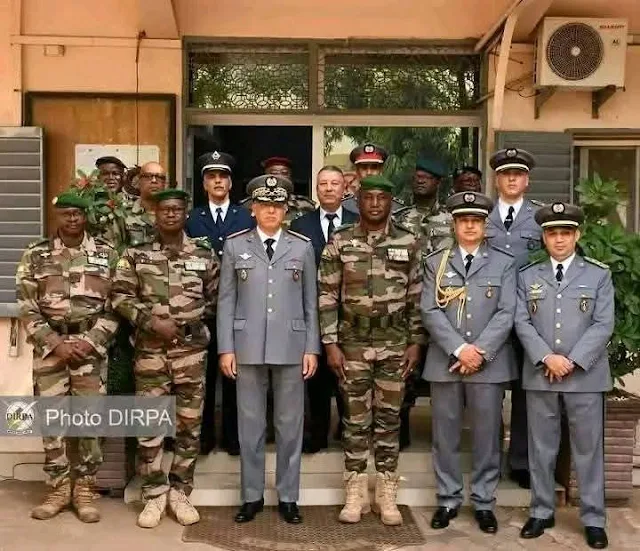Crisis Over the Turkish Akinci Drone: Between Algeria, Mali, Separatists, and Turkish Stakes — A Demonstration of Algerian Supremacy
Early April 2025: Algerian Forces Shoot Down Malian Bayraktar Drone—A Strategic Shockwave Across the Sahel-Maghreb Region
In early April 2025, an aerial incident involving a Turkish-made Bayraktar Akinci drone operated by the Malian army sent shockwaves through the Sahel and Maghreb regions. The drone reportedly breached Algerian airspace by two kilometers before being shot down by Algerian armed forces in under 26 seconds. This brief timeframe was enough to underscore a sharp strategic reality: Algeria's clear technological and operational superiority in aerial warfare and counter-drone systems.
1. Algeria: A Clear Message, A Proven Capability
In an official statement issued on April 3, 2025, Algeria's Ministry of National Defence announced that its air defense units had detected, identified, and destroyed a foreign drone that violated national airspace near Bordj Badji Mokhtar. The aircraft, identified as a Turkish Akinci operated by Malian forces, was reportedly downed less than 26 seconds after detection, while flying at an average speed of 280 km/h.
This exceptional responsiveness—enabled by a highly precise radar network and a streamlined command structure—stands as a textbook example of Algeria’s air sovereignty doctrine. The Algerian military relies on advanced surveillance and interception systems, notably Chinese-made YLC-8B radars, coupled with surface-to-air missile batteries capable of neutralizing moving targets at various altitudes.
2. Unexpected Repercussions for Morocco
Morocco, which has also recently acquired Akinci drones, suddenly finds itself under the spotlight. The stunning efficiency with which Algeria detected and destroyed such a drone casts doubt on the strategic value Rabat had placed on these aircraft.
Touted as a major technological leap, the Akinci was expected to boost Morocco’s long-range strike and intelligence-gathering capabilities, particularly in the context of the Western Sahara conflict.
Yet the Algerian demonstration clearly shows that this drone is not immune to rapid neutralization, and that Algeria’s defense systems are fully capable of intercepting complex aerial targets in record time.
For observers, there is little doubt: Algeria's technical supremacy in air defense has just been dramatically affirmed, weakening Morocco’s deterrence strategy based on Turkish hardware.
3. Competing Claims and the Battle of Narratives
The incident has also sparked a narrative war among several actors:
Malian authorities were quick to attribute the crash to a technical malfunction, denying any Algerian involvement, likely in an effort to maintain good relations with Algiers and protect the reputation of Turkish drones.
Meanwhile, Tuareg separatists from Azawad claimed responsibility, asserting that the drone was brought down by their forces within Malian territory, possibly via a surface-to-air missile.
Yet, only Algeria’s version is backed by an official state communication—coming from a country known for its military rigor. It is reasonable to assume that radar and visual evidence support this claim.
4. Ankara in Damage-Control Mode
The incident also represents a significant setback for Turkey:
The Bayraktar Akinci—flagship of Turkish defense company Baykar and centerpiece of Ankara’s arms export strategy, particularly in Africa—has suffered a serious blow to its image.
Having one of these drones shot down by an army as disciplined and capable as Algeria's could undermine its commercial credibility and potentially jeopardize future contracts.
All indications suggest that Turkey discreetly supported the Malian narrative of a technical failure to shield its flagship drone’s reputation. In reality, it seems the drone was simply overwhelmed by a defense system that was faster, more precise, and far more formidable than anticipated.
5. Conclusion: A Show of Algerian Strength
Algeria didn’t just shoot down a drone—it delivered a powerful demonstration of its integrated defense capabilities, exposing the limitations of Turkish technology and sending a clear message to its neighbors: any incursion, however minor, will be swiftly detected and dealt with.
What some are calling a "technical incident" is in fact a successful act of deterrence, illustrating Algeria’s air superiority in a region where military balances are constantly shifting. The episode positions Algiers in a place of strategic confidence, while Rabat and its allies may now have to rethink their calculations in the face of Algeria’s increasingly unassailable command of the skies.
By Belgacem Merbah




Comments
Post a Comment